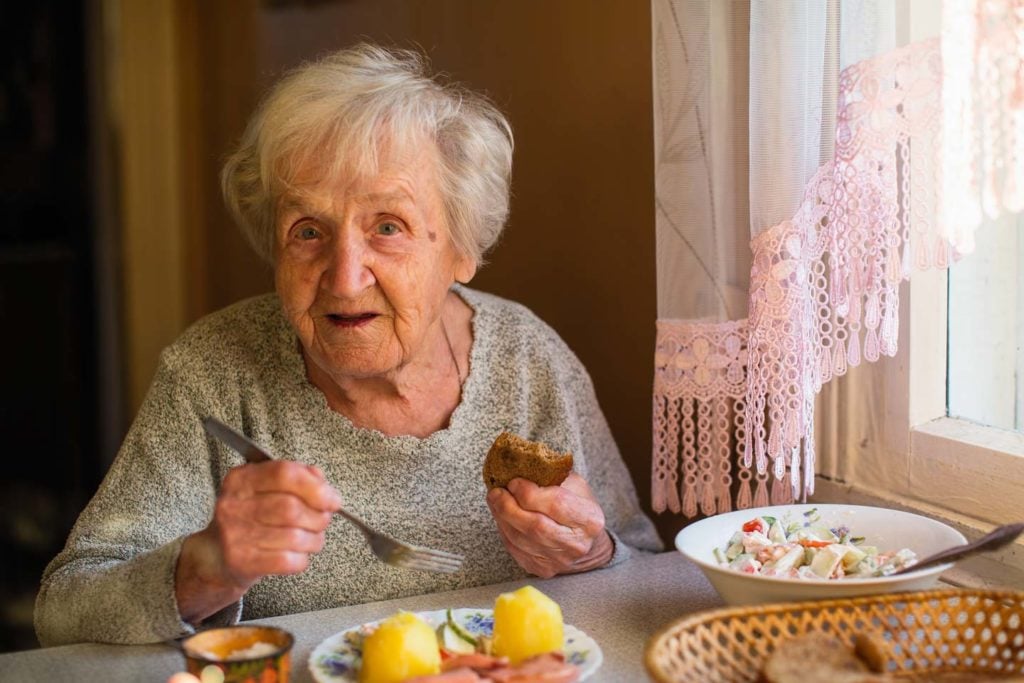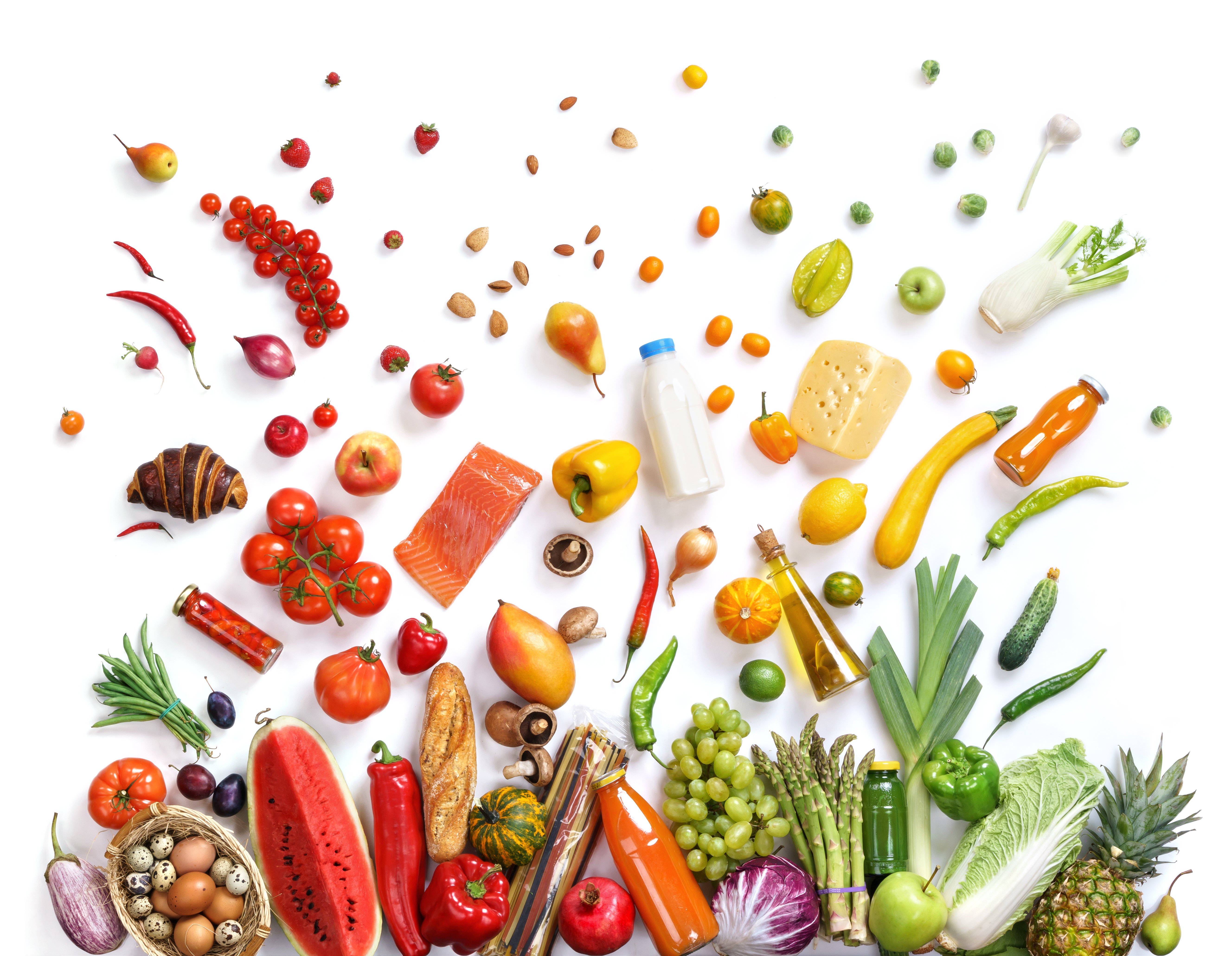Fuelling our bodies with a balanced diet and the correct nutrients is important especially for the elderly too. Sometimes changes in your lifestyle can prevent us from having access to a healthy diet. It isn’t just physical changes that affect an older person’s attitude to food. Social isolation is a major factor in making elderly people feel unmotivated to cook for one or they may lack the cooking skills.
As we get older, our nutritional needs alter so it’s important we change our diet accordingly in order to protect our body. These changes can lead to nutritional deficiencies in Calcium, Vitamin D, Vitamin B12, Iron and more. Being aware of these changes and adjusting our diet can be good at helping to prevent ill health and frailty.

Why does a good diet matter, so much as we age?
- It strengthens your immune system
- It can prevent frailty by strengthening and keeping muscles and bones healthy, preventing falls and reducing the severity of some accidents.
- It improves memory and brain health
- Reduces the risk of developing illnesses and diseases such as cancer, stroke, heart attack
- Reduces high blood pressure
- Improves overall quality of life
- It’s your main source of energy for day to day activities and exercise
Key changes that impact the elderly’s relationship with food.
The elderly are more susceptible to health problems such as diabetes, high cholesterol and high blood pressure, which often can be caused by a poor diet. To prevent these types of illnesses from developing, its important to understand the correct nutrients that should be consumed. It is worth having a conversation with a professional about certain food requirements. For example, it’s found that some foods such as onions, peppers and dairy products can be harder for the elderly to digest.
Immune System. As you age, your immune system weakens which not only make you more susceptible to common illness but also makes you prone to illnesses and food poisoning. It’s wise with age to stay clear of certain foods that are more likely to cause illness such as raw fish, eggs etc.
Oral Health. Changes in oral health can make the ability to eat a challenge. Ageing can cause oral infections, teeth deterioration, your teeth to fall out and become painful. Even if dentures are being used, it can still lead to poor eating habits. The whole process of chewing can become very laborious, reducing your desire to eat much at all.
Calories. If you have muscle problems, or joint aches this may result in doing less exercise and burning fewer calories, as you age. So, the elderly often need fewer calories in order to maintain a healthy lifestyle . Naturally, as you get older, an appetite isn’t as strong which will have an effect on the quantity of food eaten per day.
Changes in smell and taste. Smell and taste are connected, and as you age, they can weaker and less sensitive. Mostly it is a common change that occurs with age, but certain medications like antibiotics can also exacerbate this. If you can’t smell or taste, of course, food becomes bland and boring making it difficult to eat.
Parkinson’s This often results in having tremors of your hands and can have a profound impact on someones ability to eat on their own. It can cause embarrassment, frustration and despair. Meals that normally would take 20 minutes can take an hour to eat a small portion.
Dysphagia (swallowing problems) Some people with dysphagia have problems swallowing certain foods or liquids, while others can’t swallow at all. Signs of having a problem may include:
- coughing or choking when eating or drinking
- bringing food back up, sometimes through the nose
- a sensation that food is stuck in your throat or chest
- persistent drooling of saliva
- being unable to chew food properly
For more information see the NHS website on Dysphagia.
Reduced social contact. The elderly are more likely to have meals on their own whether that’s due to them living on their own, mobility issues or simply not socialising as much. This lack of social contact can make the task of eating tiresome and boring.
Overall, poor nutrition can cause a weakened immune system, illness, muscle weakness, higher chance of hospitalization, poor wound healing all of which can result in dangerous situations,
What can we do to help improve the diet of the elderly?
Introduce a Mediterranean style diet
Increasing the intake of brightly colored fruits and vegetables that are rich in carotenoids (found in the pigment of fruit and vegetables) may ultimately affect the health of older adults. Carotenoids act as a type of antioxidant and help promote our overall wellbeing. Foods rich in carotenoids include: peppers, tomatoes, carrots, kale, spinach, watermelon, mangoes and oranges.
Help with meal plans.
To ensure your loved one is eating nutritious and regular meals, you may find it helpful to assist in writing shopping lists and help with food preparation. This way you can be sure nutritious ingredients are being bought. Buying something different may just increase their interest in food. Do take personal food preferences into account when planning meals. Often their favourite meals, you knew they would love, may just not be what they want anymore. It may be too difficult to chew now or just taste bland. Encourage them to try new things to keep them interested and not disillusioned with food. They often say ‘nothing tastes as good as it used to’.
Use local services.
To make mealtime easier and different, it may be a good idea to make the most of local services that can make eating less of a chore. Have in-home/virtual conversations with nurses and dieticians. Home delivery companies like Cook are also great for loading up the fridge/freezer with nutritious, home-cooked meals that can be ready in minutes.
Make meals social occasions.
For many elderly people, mealtime is boring and this makes eating in general difficult. To encourage regular eating, make the dining area attractive but not distracting. Whether popping round for dinner or having meals over zoom, being there for them while they eat makes it a much more pleasant experience.
Portion sizes
Little and often is usually a good way of having a healthy diet as you age. Big meals, three times a day, can seem too daunting, too exhausting and reducing portion size is a good idea. Five or six smaller meals may be more appealing. Never force them to finish their food or rush them. Any leftover food will never be as appealing. Offering finger foods is also a good way to encourage people to eat if someone doesn’t want a big meal.
Avoid calorie-free or low-fat products Often products that they felt were beneficial when they were younger, such as low-fat options, are probably not a good idea when you want them to increase their calorie intake, unless your loved one has specifically been advised to eat them by their GP. Some fats can be a vital source of calories and some older people may need to eat more to maintain a healthy weight.
Staying hydrated Dehydration is very common in the elderly and can lead to many health issues such as urinary infections. Dehydration can cause confusion and hampers normal kidney function. The elderly should be drinking 1.7 litres or 6-8 glasses of healthy fluids per day. Try to make water more interesting by using cordials or flavoured water and serve it in a more special glass.
Keep on top of medications.
Some medications can cause appetite to drop, and in some cases mean that certain foods should not be eaten all together while on that medicine. Discuss concerns with a doctor/nutritionist.
Encourage regular activity.
While in general the elderly don’t tend to do as much exercise, meaning their calorie intake is less, encouraging a small amount of daily exercise or day-to-day activity is not only good for their physical and mental health but will stimulate their appetite and encourage them to eat. Doing less exercise is a natural change with age, but even doing a small amount can help their calorie intake.
For additional information on a nutrient-rich diet that will help prevent illnesses and injuries see the Eatwell Guide from Public Health England.

